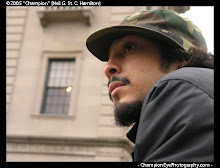4.24.2004
Nuyorican Poets' Cafe: 30 Years Running.
by Carlos Vázquez Firpi
The Nuyorican Poets` Café has been a continual hub of cutting-edge artistic exploration since the venue first opened its doors in 1974. Through the years, writers from the likes of Sandra Maria Esteves and Amiri Baraka to Allen Ginsberg and Bob Dylan have paid their dues at the Latino-founded literary institution.
Much has changed from when poet Miguel Algarín first founded the Café in order to give the then-burgeoning Nuyorican literary movement "a locality," as he puts it, "a place where everyone could find themselves at a given time and come together and hear each other." Yet the Nuyorican continues to play a significant role in the careers of up-and-coming spoken-word artists.
Nuyorican Anthony Morales (pictured above) has been performing at the Café since 1997. The 24-year-old South Bronx resident was crowned "Nuyorican Fresh Poet" in 2001 and appeared on the cover of The New York Times Arts section the following year. "The Nuyorican has been vital to my career as a writer and spoken-word artist," says Morales. "I`ve been inspired by the works originated there; but also, the venue has given me the chance to develop my voice and my work. Performing at the Nuyorican has led to many different opportunities for me, such as touring the U.S. and appearing on HBO`s Def Poetry."
As a "street poet," a sharp-eyed chronicler of the Latino community`s experience, Morales follows in the footsteps of two major Nuyorican poet-playwrights: Miguel Piñero and Pedro Pietri. Piñero`s play, "Short Eyes," and Pietri`s poem, "Puerto Rican Obituary," are the most well-known works of Nuyorican literature, and their authors figure as two of the movement`s most prominent authors.
With the deaths of Miguel Piñero in 1988 and of Pedro Pietri earlier this year, it`s largely up to the likes of Morales, Mayda del Valle and Mariposa—second-wave Nuyorican poets, if you will—to keep the literary traditions fostered at the Café alive. But spot-on wordsmiths aren`t the only thing Nuyorican poetry needs. The poetry of major Nuyorican authors like Pietri, Piñero and Esteves deals largely with the experience of Latinos struggling to survive in a world beset by poverty, drug addiction and urban decay.
The Lower East Side neighborhood which houses the Nuyorican is nothing like it was when in 1980, Piñero declaimed: "So please when I die / Don`t take me far away / keep me near by / take my ashes and scatter them thru out / Lower East Side." Gentrification over the last two decades has radically transformed the area from a poverty-stricken, text-book example of urban decay into an overpriced, trendy Mecca for yuppies and wannabe bohemians.
Yet according to Algarín, the shifting Lower East Side landscape shouldn`t pose a problem for the Café. "The most important part of the Café is that it never set out to service a particular grouping or a particular type of poet. It`s a place called poets` Café. I mean, Nuyorican indicates the growing point, the circle. It was not black America or white America, but Puerto Rican poets. But in our pulling together we never saidthat this was exclusively ours."
The growing popularity of Nuyorican Poets` Café-inspired spoken-word poetry is in large part due to the kind of universal acceptance urged on by Algarín. The Café`s role in the slam "movement"—a nationwide phenomenon since 1989—has been central as it is one of the original venues to host such competitions. Films like "Slam" and "Piñero" testify that no movie about the spoken word art form is complete without a scene at the Nuyorican.
On a recent Friday night, it was clear that more people were waiting in line for the ever-popular weekly slam competition than the moderately sized Café could possibly house. But not everyone sees slam competitions as a positive outgrowth of the Nuyorican. Pietri was outspoken about his belief that Nuyorican-style spoken word had gone from a movement to a franchise. Others would contend that the slams are limited in that only a very specific type of poem read by a particular type of poet works in these competitions; and not all poems call for animated readings and not all poets are extroverts.
In his introduction to the seminal "Nuyorican Poetry: An Anthology of Puerto Rican Words and Feelings," Algarín (pictured here)announces that Nuyorican poets must "furnish the information and the vision to empower the underclass to join the mainstream and reinvigorate the American temper. This is our mission." Whether the slam competitions have led the Café astray from its original "mission" is debatable. In any event, as the Café celebrates its 30-year anniversary, the fact that Algarín owns the building which houses the venue renders it a symbol of both survival and possibility. As long as the Café remains in the neighborhood, maybe Piñero would still want to see his ashes scattered "thru out" the Lower East Side.
check it folks
Subscribe to:
Post Comments (Atom)

No comments:
Post a Comment